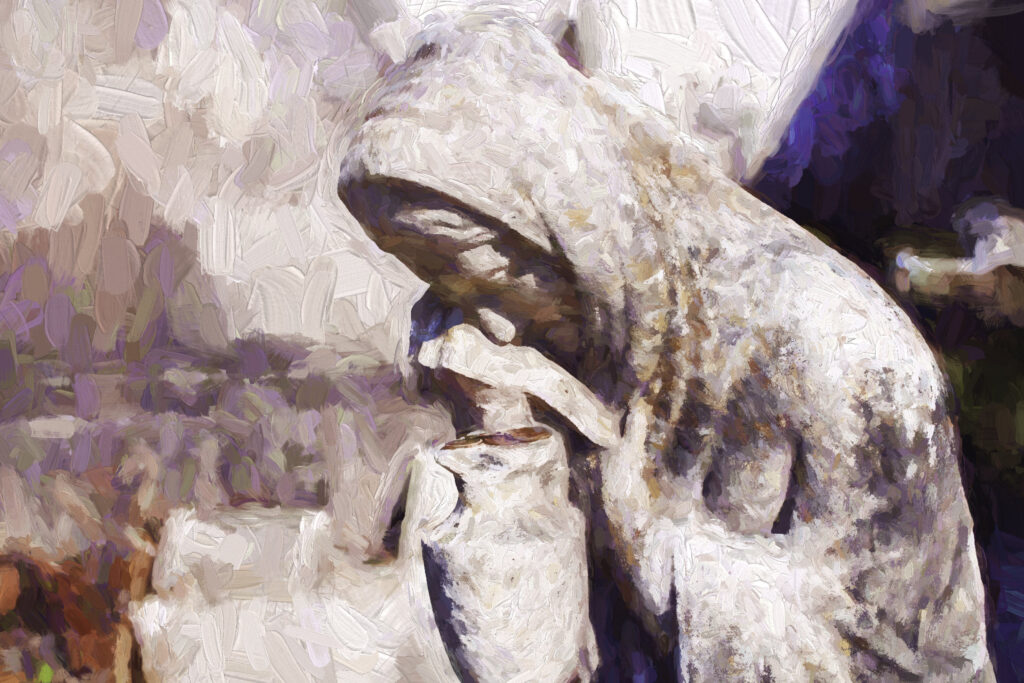Holistic therapy, a practice that emphasises the importance of whole-person care, encompasses various modalities that aim to treat the mind, body and spirit. At the heart of this practice is the therapist’s ability to recognise, understand and support clients in their most vulnerable states. Grief, as one of the most complex and profound human emotions, stands as a crucial subject for holistic therapists to grasp thoroughly. Unfortunately, this is not reality. Many therapists, despite their good intentions, are not prepared to meet the demands of assisting a client who is profoundly grieving and may be on the brink of a psychological disorder.
Holistic practice is rooted in the belief that our wellbeing is more than just the absence of physical pain or psychological distress. It encompasses our spiritual and emotional health, intertwined within the very fabric of our being. At the core of this approach is the therapist’s sincere desire to serve, to heal and to foster connections that bridge the body, mind, spirit, or heart. Grief is perhaps one of the therapist’s greatest challenges that he or she can face. In fact, many therapists actually make it clear they cannot help as they are ill-equipped to deal with a grieving individual. Although their longing to help is strong, not all holistic modalities are equally effective for those who are grieving. Those who specialise in bodywork, however, may offer a higher level of support and understanding that can truly complement their peers.
A desire to serve and heal
Holistic therapists, by the nature of their profession, often feel a genuine calling to help others. People who have personally experienced the benefits of natural holistic living are often motivated to share their knowledge and promote overall wellbeing for the mind and body.
While there are many individuals who view their work as simply a job and lack dedication, there are a substantial number of healers who consider their service a calling rather than just a job. They are driven by the following:
- Empathy – A profound ability to feel and share another person’s emotions;
- Purpose – A deep desire to bring about positive change in someone’s life;
- Commitment – Dedication to the art and science of holistic healing.
Therapists often identify themselves as a kind of guide who walks with their client on a journey of health and healing. This is a sacred journey that will often result in transformative experiences and even deep spiritual realisations. The desire to serve in this way is more than technique; it’s a full life transformation and the true therapist fulfils their deepest desire to serve without condition. The relationship between the client and the therapist is one that is truly sacred and involves an inordinate amount of trust. Trust, of course, is the cornerstone of the grieving journey.
The trinity of grief and the grief journey
Grief, as an emotion, does not solely live in the mind. Its echoes reverberate through the body and heart, often manifesting as physical ailments, mental distress and emotional turmoil. In fact, many ailments that you will treat as a therapist could actually be a direct result of the grieving journey, which has then manifested as physical ailments. These emotions may manifest in the following ways:
Physical symptoms: These often appear in individuals experiencing grief. These symptoms may include fatigue, body aches and sleep disturbances and can be signs that the grief has not been resolved. Furthermore, failing to acknowledge grief fully and engage in dedicated mourning can lead to more profound repercussions, hindering the individual’s ability to navigate their grief and make meaningful progress.
Mind: Your mind is the psychological building block of your reality. Therefore, the grief you experience can cloud judgment, affect memory, or lead to anxiety and depression. If someone were to fall into prolonged grief disorder, this could lead to a full mental imbalance requiring psychological intervention.
Heart: Beyond the mental symptoms, grief deeply affects our emotional core, influencing our ability to love, trust and connect. The biggest aspect of grief in an individual is the sense of disconnection from everything, including themselves and even a higher power.
In their relentless pursuit of healing, holistic therapists fully comprehend these complex interconnections and approach grief from a trinity perspective, guaranteeing a comprehensive and long-lasting treatment.
The imperative of deep understanding of the depths of grief
Understanding grief at a superficial level is akin to passing someone on the street and just nodding in their direction or offering a wry smile. The intent may be good, but it is often missed due to the person you connect with being unaware at the moment. It could also be like looking at the surface of a lake and not knowing the lake has depth and life below what you perceive. A deeper exploration reveals much more: Every person’s grief is a unique blend of emotions. No one person’s grief is the same and it is a vast ocean with depths you can only imagine. What lies beneath could eat you or teach you, depending on the choices you make in your moment of awareness. Therefore, you, as the healer, must look beyond the surface of the ocean and be willing to swim to the depths with your client. Remember, those oceans are vast and border differing cultures.
The cultural lens: Understanding grief in its multifaceted dimensions
Grief, a universal human experience, is profoundly shaped by the cultural environments in which we are raised and live. Different cultures possess distinct rituals, beliefs and narratives surrounding death, loss and mourning. For holistic therapists, a deep comprehension of these cultural nuances is not just beneficial but essential. To heal the heart and soul, one must first understand the cultural tapestry from which these emotions spring.
Rituals and traditions
Every culture has its own set of rituals and traditions related to death and mourning. Each cultural perspective tackles grief differently and you, as the therapist, may face a client from that culture. If you cannot be with them in their grief and understand their perspective, then you do them a disservice. Let’s look at some of those cultural perspectives.
Indigenous culture: Grief in indigenous cultures is connected to nature, ancestors and spiritual beliefs. Ceremonies are held to help people cope with loss within the context of life and community. Cultures such as Native American or African tribes have a deep focus on the shamanistic journey and understanding the afterlife in their cultural narrative.
East Asian cultures: For many in countries like China and Japan, ancestral worship and yearly rituals to honour the deceased are deeply rooted. The belief that ancestors continue to play a role in the lives of the living can influence how grief is experienced and expressed. In fact, in Japan, it is not unusual for a family to hold space for their ancestors at the feast table.
Latin American cultures: The Day of the Dead (Día de Muertos) in Mexico is a testament to the vibrant and communal way grief is processed, where death is embraced as a natural phase in life’s continuum.
Middle Eastern and North African cultures: Mourning periods, specific reading of religious texts, and communal prayers are deeply embedded in the grieving process.
Understanding these rituals offers a lens into the collective psyche of a culture, helping therapists navigate the complex emotional terrain of their clients.
Discerning grief in clients
Grief isn’t always obvious. Clients may not always directly express their pain, but it can be observed through their actions, body language, tone of voice and even the way they speak and the energy behind their words. A holistic therapist should be trained to detect these subtle cues. Such discernment requires a deep sense of empathy and an astute inner observational ability. But perhaps the greatest tool that a therapist can have at their disposal is the capacity to use their innate intuitive gifts. However, this must be developed and trained properly, as too many self-proclaimed intuitives are often driven by ego and fail to discern their intuitive power.
How you might sense grief as a therapist
Let’s get into the experiential process of how you, as a therapist, may sense grief in the client beyond the physical symptoms. As a therapist, you will have heightened senses, especially as you begin to touch someone’s physical form. You are in fact engaging in a dance of spiritual energy that flows from the universe from spirit, through spirit and back to spirit. In the wonderful realm of the auric field and energy centres, one can truly feel the mesmerising energy coming from higher dimensions. As the captivating current of universal energy flows, it opens up the incredible possibility of sensing communication from the mysterious realms beyond life.
Now, I am not advocating that you get a sense of connectedness from the other side and then hang your shingles up as a professional medium. However, you have a very important role to play in your client’s journey and this is the time to set your ego aside.
Exploring the ‘afterlife’ connection
Many people believe in the presence and messages from the ‘other side.’ Regardless of one’s personal beliefs, a holistic therapist must approach the subject with an open mind, especially if it offers comfort to those in grief. As a massage therapist, it’s important to stay relaxed while serving your clients, even if your job is physically demanding. You will then perhaps pick up signs and signals through your own vibration, such as images you may see in your mind’s eye or what you may sense through your other psychic senses. It is important to allow these to come to your awareness and then you must learn to discern. We will delve deeper into this in a future article.
The idea that a loved one might send signals or messages from beyond is comforting to many. Holistic therapists may find themselves acting as intermediaries, trying to understand the feelings and signs they might pick up from the afterlife. But remember, you have a serious responsibility and it’s not to be taken lightly. Remove yourself from the ego and enter a new level of professionalism to serve without condition.
Responsibilities in communication
The prospect of receiving messages from the afterlife can be both intriguing and controversial. However, one wrong word or one wrong tone, may cause a client to spiral into a deeper state of grief. Therefore, it is important to develop and seek professional training on how to harness this within your practice. |
Ethics and authenticity
Unfortunately, many people get caught up in the false perceptions of mediumship and serving spirits. Just because a therapist says they have mediumship abilities doesn’t mean they’re actually a medium. They should focus on professional development instead of getting caught up in fame and ego. I actually coined a term for this in my previous book, Deadly Departed, called ‘the Gucci handbag syndrome.’ It’s paramount to maintain integrity. Exploiting someone’s grief by making unfounded claims or providing false hope is unethical and a worst-case scenario would be catapulting the client into severe psychological unbalance or, worse, psychosis.

Jock Brocas is a renowned evidential spiritual medium, best-selling author and respected paranormal researcher. With an unwavering commitment to authenticity, Jock blends his rich spiritual experiences with extensive scholarly study, inspiring thousands across the globe. His intuitive abilities and dedication to truth have fuelled his popular books, such as Deadly Departed and Powers of the Sixth Sense. Jock uses his deep understanding of the afterlife to support those grieving, providing comfort through afterlife education. An influential figure in his field, Jock continues to captivate audiences with his fascinating insights into the spiritual realm and the unexplored corners of the human psyche. His work reshapes our understanding of life, death and what lies beyond, offering us a unique lens into the extraordinary.


